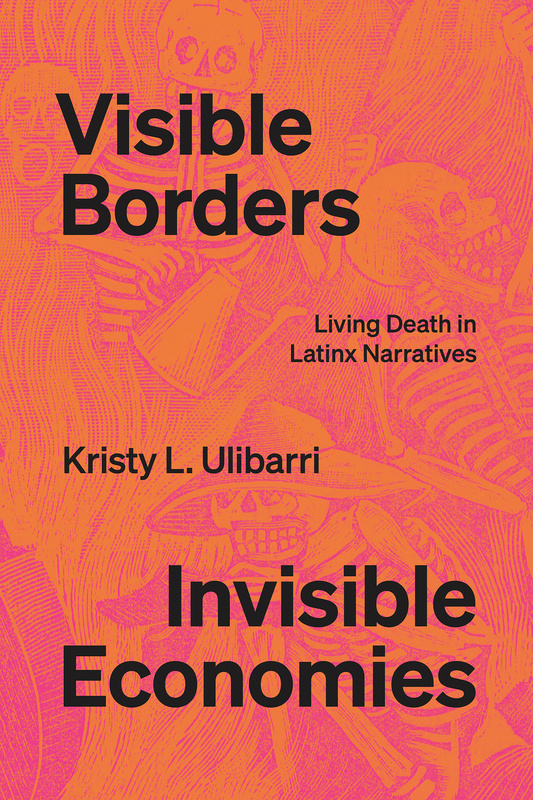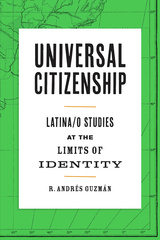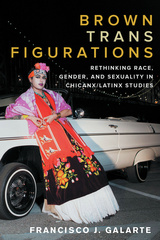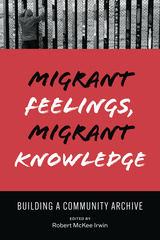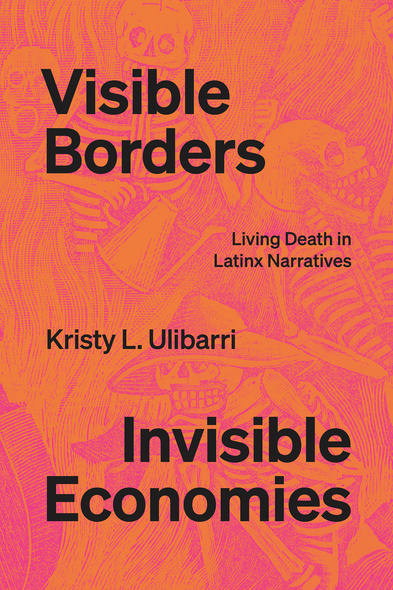
Visible Borders, Invisible Economies
Living Death in Latinx Narratives
2023 Outstanding Book Award, National Association for Ethnic Studies
A thorough examination of the political and economic exploitation of Latinx subjects, migrants, and workers through the lens of Latinx literature, photography, and film.
Globalization in the United States can seem paradoxical: free trade coincides with fortification of the southern border, while immigration is reimagined as a national-security threat. US politics turn aggressively against Latinx migrants and subjects even as post-NAFTA markets become thoroughly reliant on migrant and racialized workers. But in fact, there is no incongruity here. Rather, anti-immigrant politics reflect a strategy whereby capital uses specialized forms of violence to create a reserve army of the living, laboring dead.
Visible Borders, Invisible Economies turns to Latinx literature, photography, and films that render this unseen scheme shockingly vivid. Works such as Valeria Luiselli’s Tell Me How It Ends and Alex Rivera’s Sleep Dealer crystallize the experience of Latinx subjects and migrants subjugated to social death, their political existence erased by disenfranchisement and racist violence while their bodies still toil in behalf of corporate profits. In Kristy L. Ulibarri’s telling, art clarifies what power obscures: the national-security state performs anti-immigrant and xenophobic politics that substitute cathartic nationalism for protections from the free market while ensuring maximal corporate profits through the manufacture of disposable migrant labor.
Ulibarri offers a model for reading other Latinx literature in the context of rising immigrant detentions . . . The interplay of border visibility and economic invisibility reveals a politically charged truth about the disposability of immigrant life hidden within the auspices of border/national security. Further, these truths are visible in the imagined world of art be it prose, photography, or film.
Ubarri’s analysis of Latinx narratives...is expansive and illuminating...The book’s strength is its uncompromisingly interdisciplinary approach, which is essential for understanding contemporary migration narratives.
Ulibarri's textured readings...illuminate the hidden economy elided by mainstream immigration discourse...[and her] frame of necropolitics bridges Latinx criticism to related concepts from fields of queer, Black, and affect theory.
Challenging conventional perspectives and misconceptions, Visible Borders, Invisible Economies redefines the Latinx subject as a formidable force. Ulibarri understands the United States’ economic dependence on migrant labor and confronts the legislative barriers that hinder opportunities for Latinx people. However, the book’s analysis goes beyond historical, political, and economic aspects, positioning them as supplements tothe Latinx narratives in literature, photography, and film. Rather than presenting a unilateral perspective on Latinx agency and biopower, the book highlights the reciprocal dependence between the United States and migrant communities.
Stylistically compact, but packing a mighty punch, Visible Borders, Invisible Economies is intellectually ambitious in its aim to analyze instances of death in Latinx literary and cultural texts. This work stands out from much of the scholarship in contemporary Latinx literary studies because it brings the literature into a conversation with the political and economic needs of capitalism.
Kristy Ulibarri’s compelling book shows the interconnections between neoliberal market logics, immigration policies, and Latinx violence and death, both social and physical.
Kristy L. Ulibarri is an assistant professor in the Department of English and Literary Arts at the University of Denver.
- List of Illustrations
- Acknowledgments
- Introduction: Imagination in the Age of National Security and Market Neoliberalization
- Part I. Documenting the Living Dead
- Chapter 1. Games of Enterprise and Security in Luis Urrea, Valeria Luiselli, and Karla Cornejo Villavicencio
- Chapter 2. Documenting the US-Mexico Border: Photography, Movement, and Paradox
- Chapter 3. Latinx Realisms: The Cinematic Borderworlds of Josefina López, David Riker, and Alex Rivera
- Part II. Imagining the Living Dead
- Chapter 4. Markets of Resurrection: Cat Ghosts, Aztec Zombies, and the Living Dead Economy
- Chapter 5. Speculative Governances of the Dead: The Underclass, Underworld, and Undercommons
- Coda: Dreaming of Deportation, or, When Everything “Goes South”
- Notes
- Bibliography
- Index

